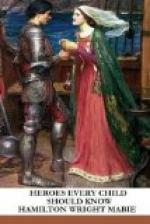About this time the King began to have dealings for peace with the Caliph Saladin, sending an embassage to him, and receiving the like from him. But it was ever thus that the King asked more than he looked for the Caliph to give; and the Caliph promised more than he had the purpose to fulfil. There were many courtesies passed between them, and gifts also. King Richard would send a set of hawks, and, indeed, he had not much that he could give; but the presents that came from the Caliph were of exceeding richness and splendour; there was a tent made of cloth of gold, and horses such as Kings only have in their stalls, and rare beasts and birds, and snow from Lebanon, for the cooling of wines, and many other things, both for show and for use, of which it were long to tell. And these things, for all that they were costly, served the Caliph’s purpose well, and for this reason, they seemed to show his good will, and all the while he was busy destroying the towns and laying waste the country. Of these things the King heard something, but not all, for in the matter of news he was ill served. And all the while the Turks ceased not to do all the mischief that they could, slaying such as strayed from the camp, yea, and coming into the camp itself, and doing men to death in their very tents, and Saladin, or rather Saphadin, his brother, for he it was who held converse with King Richard, when complaints were made of their deeds, affirmed that they were done by robbers and others who were not subject to him, and paid no reverence to his commands; of which pretence there need be said this only, that these robbers or murderers, whether they were the Caliph’s men or no, never harmed any but such as were his enemies.
For all this King Richard still strove by all means that he could devise to come to a peaceful agreement with his adversaries. Nor did he refuse any instrument by which he might hope to compass this end.
When a whole moon had been wasted in parleying and the sending of messengers to and fro, the King, seeing that he must accomplish his purpose by force of arms or not at all, led his army towards the Holy City. It would serve no profitable end to tell of the other places where he pitched his camp, or of the days which he tarried in this or that. Let it suffice to say that in a month’s time he traversed so much space only as an army well equipped might pass over in a single day’s march; and that about twenty-one days after the winter solstice the army of the Christians came to a certain place which is named the Casal of Beitenoble, and which in ancient times was, if I err not, a city of the priests. There it tarried some twelve days, being much troubled by storms and rains, for the winds blew and the rains fell during the whole of this time, in such a fashion as I have never seen. As for the tents, only such as were appointed with ropes and so forth could be kept in their place, so violent were the blasts, so that the greater part of the army lay under the open sky, not a little to the damage of their health. The horses also were in evil case. These creatures, all men know, suffer from much sickness, and multitudes of them perished. Also there was a great scarcity of victuals; for the corn and even the biscuit were spoilt by the rain, and the hogs’ flesh grew corrupt.




